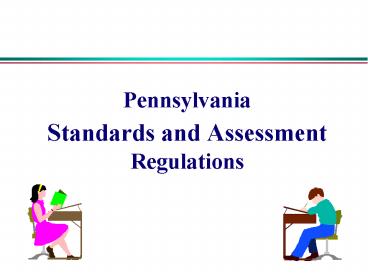Pennsylvania Standards and Assessment Regulations - PowerPoint PPT Presentation
1 / 29
Title:
Pennsylvania Standards and Assessment Regulations
Description:
Academic Standards define content and skills students should learn in each ... Cross-reference with other content standards where applicable ... ( Begins SY 2002-3) ... – PowerPoint PPT presentation
Number of Views:40
Avg rating:3.0/5.0
Title: Pennsylvania Standards and Assessment Regulations
1
Pennsylvania Standards and Assessment Regulations
2
PDE Home Page is www.pde.psu.edu
Good Stuff!
Pennsylvania department of Education
3
WHAT ARE ACADEMIC STANDARDS?
- Academic Standards define content and skills
students should learn in each subject area by
designated grade levels.
Standards Science, technology, environment and
ecology
4
Academic Standards
- Define expectations that students need to know
and be able to do - Reflect measurable aspects of learning
- Cross-reference with other content standards
where applicable
5
Pennsylvania Academic Standards are...
- Challenging
- Measurable
- Applicable
- Clear
6
Participants in STEEP Standards
7
Performance Levels
- Express the degree of achievement on
standards-based assessments. - Levels are advanced, proficient, basic and
below basic.
8
Performance Level Setting (4.51)
- In consultation with educators, students,
parents and citizens, the Department will develop
and recommend to the Board for its approval
specific criteria for advanced, proficient, basic
and below basic levels of performance.
9
Advanced Students(Classroom Connections, 1998)
- Demonstrate a broad in-depth understanding of the
complex concepts and skillsmake abstract,
insightful, complex connections..extensive
evidence for inferencesapply knowledge and
skills effectively and independently communicate
effectively and thoroughly with sophistication
10
Proficient Students(Classroom Connections, 1998)
- general understanding make meaningful, multiple
connections among important concepts supporting
evidence for inferences apply concepts and
skills to solve problems using appropriate
strategies communicate effectively
11
Basic Students(Classroom Connections, 1998)
- Demonstrate partial understanding and
interpretationsimple connections.. Limited
support routine problem-solving limited
communication ability
12
Below Basic Students(Classroom Connections, 1998)
Demonstrate minimal understanding of rudimentary
concepts and skills provide minimal evidence or
support for inferences and solutions have
difficulty applying basic knowledge and skills
communicate in an ineffective manner
13
Graduation Performance Standard (4. 24)
- School District establishes local requirements in
its strategic plan. - All students shall demonstrate proficiency in
reading, writing and mathematics on either state
assessment or local assessment aligned with
academic standards at the proficient level or
better.
14
Graduation Performance Standard (4. 24)
- Students who score proficient or advanced on
State PSSA will have a seal affixed to their
diplomas. (Begins SY 2002-3) - Culminating project that assures student ability
to apply, synthesize and evaluate information and
communicate significant knowledge and
understanding.
15
Implementation TimelinesCall PDE for updates
- 4.51- annual testing of reading in 5, 8, 11 math
in 5, 8, 11 to assess the standards beginning in
1999 - (e) Students not proficient in initial testing
get one more chance in grade 12 - (f) Expansion of testing via revision of chapter 4
16
Nature of State Assessment Instruments (4.51b)
- Standards based
- Criterion referenced
- Essay or open ended response in addition to
selected response - Various proportions depending on grade
- Do NOT require particular beliefs, attitudes or
values
17
Planned Instruction (4.11h)
- Standards and objectives
- Measurement of meeting the standard
- Content, activities, materials, time
18
Standards Based Assessment
- LESS emphasis on
- Discrete knowledge
- Achievement
- External Assessment
- MORE emphasis on
- Rich well-structured knowledge
- Achievement and opportunity to learn
- Internal and teacher developed assessments
19
Assessment? In general terms...
- Guides student learning
- Vital in evaluating school success
- Aligns with the academic standards
- Drives curriculum and teaching
20
Pennsylvania Assessment Through Themes Project
21
Pennsylvania Assessment Through Themes
Resources
Portfolio Guide
STEEP Assessment Handbook
Assessment Terms
Fairness Guidelines
22
STEEP- Science, Technology, Environment and
Ecology Processes
- Grade 4, 7, and 10
- Selected response items
- Constructed response items
- Performance Tasks
- Rubrics
- Anchor papers
- STANDARDS BASED FOR LOCAL USE
23
Participation
- 18 Intermediate Units
- 13 Universities / Colleges
- 50 School Districts
- 5 Private Schools
- 11 Other Organizations
24
Relating S/T/EE Disciplines
Models
Systems
Patterns
Scales
EE
Students
TECH
SCI
Interdisciplinary
25
THEMES
- Patterns
- Models
- Systems
- Scale
26
PATTERNS
- Repeated processes exhibited in a wide variety of
ways - Identifiable recurrences of element and / or form
27
MODELS
- Simplified imitation of something that can help
us understand it better. - Physical Models
- Conceptual Models
- Mathematical Models
28
SYSTEMS
- Related objects that work together to achieve a
desired result. - Open Loop Systems Do not have feedback,
therefore can not modify themselves - Closed Loop Systems Have feedback, therefore the
system can modify itself
29
SCALE
- Relates concepts and ideas to one another by some
measurement. - Can be quantitative and numerical.
- Abstract and ideological.
- Provides a measure of size and / or incremental
change.































